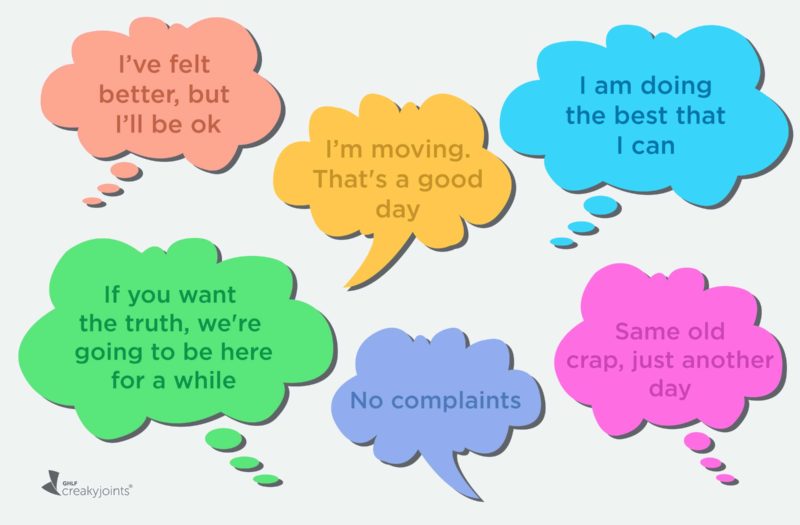‘I’m fine.’ Such a simple answer. And for people living with chronic invisible illnesses like arthritis or chronic pain, it’s often an incredibly misleading answer, if not a downright lie.
For Arthritis Awareness Month this year, we launched a social media-driven project called “Fine Is Not Fine” to highlight the complexities of living with chronic pain conditions. We know how common it is to simply say “I’m fine”— to a friend, family member, neighbor, stranger, co-worker, or even a health care provider — when the real answer is so much more complicated.
Many people in the CreakyJoints or Global Healthy Living Foundation communities tend to answer ‘I’m fine’ because it’s less painful, draining, and frustrating than being honest or going into too much detail. You can read more here about why people say they respond this way.
But among the thousands of comments, likes, and shares we saw across our “Fine Is Not Fine” project, we also noticed many patients said they don’t automatically say that they’re fine. Instead, they have other responses that they feel are more effective at communicating with others about how they’re doing. Here is sample of their feedback.
Alternative Responses to ‘I’m Fine’
“I want to say, ‘I’m a total badass for getting out of bed today, how are you?’”— Kathryn B.
“I try to say things like ‘not the best, but I’ve got this’ or ‘I’ve felt better, but I’ll be ok.’ Those statements help me to give an answer to someone and not get a million questions in return, like I would if I said ‘fine.’ I don’t have the energy to answer questions about how I feel, when I feel bad.” — Molly S.
“I decided to stop lying when asked the question, but I don’t go into it. I may say something like, ‘Pretty crappy, but it could be worse.’ No, your grocery checker doesn’t want to hear your whole story and doesn’t have the time, but you’d be surprised how often they respond with something genuine. I keep it simple but truthful, but don’t go into details, which I don’t want to share anyway. Sometimes I just don’t want to get into it at all and just answer, ‘OK,’ but still not ‘fine,’ which sounds like I’m doing well.” — Mark K.
“In response to questions about how I feel: ‘Do you want to know the truth or do you want me to lie? Because if you want the truth, we’re going to be here for a while.’” — Karen H.
“‘I am doing as well as expected. Thank you for asking’ is a perfectly acceptable answer 90 to 99 percent of the time. When I was first diagnosed I had a steep learning curve. I appreciated others who, through letting me talk, helped me sort all the information I must now understand and figure out how to manage. Even at the beginning, I never expected anyone else to ‘help’ or take care of me. I did need my closest circle to understand that my bailing sometimes was because of my health challenges, not my dislike of them.” — Nancy K.
“My response is usually, ‘I’m moving. That’s a good day.” — Jamie W.
“‘I am doing the best that I can’ will be my new catchphrase, especially during this COVID-19 pandemic. My pain is off-the-charts like a bad roller coaster ride and is so unpredictable. You never know when you are going to have a good day or a bad day. My anxiety grips me like a vice, and once it hits, not even my anti-anxiety meds help. I am like a balloon that is bouncing off the ceiling. I am so frazzled most days that it is hard to think.” — Leslie M.
“I don’t see the point in trying to hide it. I don’t hire out advertising space but I won’t suffer just to make someone else feel comfortable either. Part of the reason we need to raise awareness is because people hide it.” — Elle F.
“Most of the time I put a smile on my face and tell them ‘great!’ Nobody wants to hear about my problems. I’d much rather talk about something fun and enjoyable.” — Lynn K.
“Sometimes it’s too real and depressing to admit or try to explain. The best saying is ‘same old crap, just another day!’” — Anita E.
“If I’m able to do something active, like cook something or do the dishes, for 10 continuous minutes at a time, I say ‘great’ because that is a victorious thing. When that isn’t the case, I might say I’m having a ‘slow day.’ Since I live alone people usually don’t get to see how I’m moving. Maybe it’s pathetic or I’m a Pollyanna but I do celebrate when I’m at the top of my game, tootling about at 10 minutes without resting. But I don’t go out of my house if that’s not the case. I basically hide in plain sight. The pain is mine; I choose not to share it.” — Carol S.
“I usually say, ‘I’m breathing and the bills are paid, so I consider that a good day!’” — Eileen A.
“I just say, ‘no complaints.’ It’s the truth. Nobody wants to hear me complain.” — Vivian G.
Not Sure What’s Causing Your Pain?
Check out PainSpot, our pain locator tool. Answer a few simple questions about what hurts and discover possible conditions that could be causing it. Start your PainSpot quiz.






